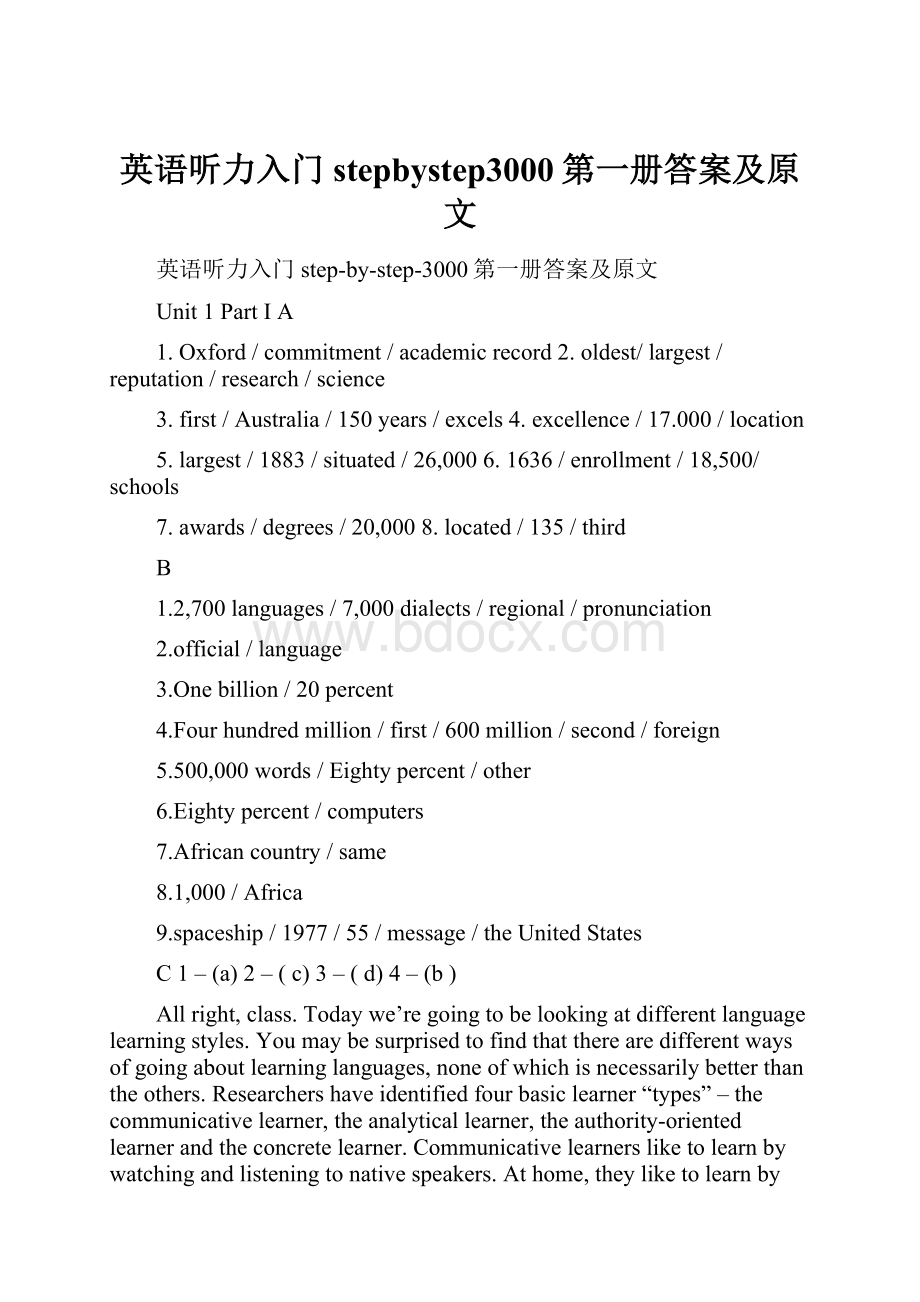英语听力入门stepbystep3000第一册答案及原文.docx
《英语听力入门stepbystep3000第一册答案及原文.docx》由会员分享,可在线阅读,更多相关《英语听力入门stepbystep3000第一册答案及原文.docx(87页珍藏版)》请在冰豆网上搜索。

英语听力入门stepbystep3000第一册答案及原文
英语听力入门step-by-step-3000第一册答案及原文
Unit1PartIA
1.Oxford/commitment/academicrecord2.oldest/largest/reputation/research/science
3.first/Australia/150years/excels4.excellence/17.000/location
5.largest/1883/situated/26,0006.1636/enrollment/18,500/schools
7.awards/degrees/20,0008.located/135/third
B
1.2,700languages/7,000dialects/regional/pronunciation
2.official/language
3.Onebillion/20percent
4.Fourhundredmillion/first/600million/second/foreign
5.500,000words/Eightypercent/other
6.Eightypercent/computers
7.Africancountry/same
8.1,000/Africa
9.spaceship/1977/55/message/theUnitedStates
C1–(a)2–(c)3–(d)4–(b)
Allright,class.Todaywe’regoingtobelookingatdifferentlanguagelearningstyles.Youmaybesurprisedtofindthattherearedifferentwaysofgoingaboutlearninglanguages,noneofwhichisnecessarilybetterthantheothers.Researchershaveidentifiedfourbasiclearner“types”–thecommunicativelearner,theanalyticallearner,theauthority-orientedlearnerandtheconcretelearner.Communicativelearnersliketolearnbywatchingandlisteningtonativespeakers.Athome,theyliketolearnbywatchingTVandvideos.Theyliketolearnnewwordsbyhearingthem.Inclass,theyliketolearnbyhavingconversations.Now,concretelearnersliketoleanbyplayinggames,bylookingatpicturesandvideosinclass,talkinginpairs,andbylisteningtocassettesathomeandschool.Now,authority-orientedlearners,ontheotherhand,liketheteachertoexplaineverything.Theyliketowriteeverythingdownintheirnotebook,andtheyliketohaveatextbook.Theyliketolearn
collegestudentsarecalled“freshmen”,inthesecondthey’recalled“sophomores”,inthethirdyearwecallthem“juniors”andinthefourthyearthey’recalled“seniors”.Nowalotofhighschoolgraduatesthengotocollegeoruniversityandtheydoafour-yearfirstdegreecourse.Someofthemmightgotojuniorcollegewhichisatwo-yearcourse.
Well,inAustralia,wellmoststatesanyway,childrenstarttheirprimaryeducationatfiveafterperhapsabrieftimeinkindergarten.Theywillstayatprimaryschooluntilthey’reabouteleven,thenthey’lleitherstaythereorgotoanintermediateschoolforacoupleofyears.Thentheystarthighschoolusuallytwelveorthirteen,whichyoustartinthethirdform.Now,afterthreeyearsathighschoolyousitageneralexam,somestatescallitSchoolCertificateandthatisasortofgeneralqualificationandthatifasortofgeneralqualification.AfterthatyoucanleaveschoolatsixteenoryoucangoonandsityourUniversityEntranceExamination,whichthengivesyouentréeintoauniversityorit’sanotherusefulqualification,andfromthenonyougotovarioussortsofhighereducation.
EducationinCanadaisaprovincialresponsibility,butschoolsareadministeredbylocalschoolboards.
Kindergartenisforchildrenwhoarefourorfiveyearsold.Childrenbeginformalfull-dayschoolinginGrade1,whentheyareaboutsixyearsold.Theymuststayinschoolatleastuntiltheyaresixteen.However,moststudentscontinuetofinishhighschool.Somegotocollegeoruniversity.Eachyearofschoolingrepresentsonegrade.(TheschoolyearextendsfromthebeginningofSeptembertotheendofJune.)ElementaryschoolincludeskindergartentoaboutGrade8.Secondaryschool(orhighschool)maystartinGrade8,9,or10anditusuallycontinuesuntilGrade12.
InCanada,studentsmaygotouniversityortoacommunitycollege.Iftheywanttolearnskillsforspecificjob,theyattendcollegeforoneorfouryearstogetadiplomaorcertificate.Forexample,labtechnicians,child-careworkers,andhotelmanagersgotocollege.Universitiesofferdegreeprogramsaswellastrainingprofessions,suchaslaw,medicine,andteaching.
Universitiesofferthreemainlevelsofdegrees.Studentsearnabachelor’sdegreeafterthreeorfouryearsofstudy.Amaster’sdegreecantakeanotheryearortwo.Adoctoratemaytakeafurtherthreetosevenyearstocomplete.
B1Idioms/vocabulary/French/spelling/pronunciation
B21.F2.T3.F
I–InterviewerP–Professor
I:
AndnowwehaveaninterviewwithProfessorJ.T.Lingo,ProfessorofLinguisticsatChimoUniversity,whoisheretotalktousaboutthegrowingbusinessofteachingEnglish.Goodmorning,professorLingo.
P:
Goodmorning.
I:
IunderstandthatteachingEnglishisbecoming“bigbusiness”allaroundtheworld.
P:
Itseemsthatlanguageschoolsarespringingupeverywhere.
I:
Whyisthat?
P:
Withthemovetowardaglobaleconomy,Englishhasbecomethemostwidelyusedlanguageintheworld.Itisthelanguageofbusiness,aviation,scienceandinternationalaffairsandpeoplefindthattheymustlearnEnglishtocompeteinthosefields.
I:
AnddopeoplefindEnglishaneasylanguagetolearn?
P:
Well,everylanguagehassomethingaboutitthatotherpeoplefinddifficulttolearn.Englishissuchahodgepodgeofdifferentlanguages–it’sessentiallyGermanicbutalotofitsvocabularycomesfromFrench,andtechnicalwordsstemfromLatinandGreek.ThisfeaturemakesEnglishfairlyadaptable–whichisagoodthingforaworldlanguage–butitcausesirregularityinspellingandpronunciation.
I:
Englishspellingbafflesme,too.
P:
Englishalsohasthelargestvocabulary.Oftentherearewordsforthesamething,oneisAnglo-SaxonandonefromtheFrench–like“buy”whichisAnglo-Saxonand“purchase”whichisfromtheFrench.TheFrenchwordoftenhasmoreprestige.
I:
Anglo-Saxon?
P:
That’sthewordforOldEnglish.TheNormanConquestin1066broughttheFrenchlanguagetoBritainandhelpedEnglishevolveintotheEnglishitistoday.
I:
IsthereanythingelseparticularlydifficultaboutEnglish?
P:
Well,theidiomsininformalEnglishposeaproblemforsomestudents.
I:
InformalEnglish?
P:
Aswithanylanguage,therearedifferentvarieties:
slang,colloquial.Formal,written,aswellasthedifferentdialects–British,AmericanandCanadianEnglish.
I:
AndhowisCanadianEnglishdifferentfromAmericanandBritish?
P:
CanadianEnglishisclosertoAmericaninpronunciationandidiom.SomeofourwordsandourspellingsdoreflectBritishusage,however.Wewouldn’tusetheBritishterm“lorry”fortruck,butwehavekeptthe“o-u-r”spellingsinwordssuchas“honour”and“colour”.
I:
Thishasbeenveryinteresting.I’mafraidwe’reoutoftime.Ithasbeenapleasuretalkingtoyou.
PartIIIUniversityLifeA1I.Age/ForeignstudentpopulationII.15hrs(+2or3forlab)/Discussiongroup:
15-20/muchsmaller/informal,friendly/2-3hrs:
1hr
TodayI’dliketogiveyousomeideaabouthowlifeatanAmericanuniversityorcollegemightbedifferentfromthewayitisinyourcountry.Tobesure,thestudentbodyonaU.S.campusisaprettydiversegroupofpeople.Firstofall,youwillfindstudentsofallages.Althoughmoststudentsstartcollegeataroundtheageof18,youwillseestudentsintheir30sand40sandevenoccasionallyintheir60sand70s.StudentsonaU.S.campuscomefromawidevarietyofsocioeconomicbackgrounds.Manystudentsworkatleastpart-time,someofthemworkfull-time.Manystudentsliveindormitoriesoncampus,somehavetheirownapartmentsusuallywithotherstudents,andothersliveathome.Somecollegesanduniversitieshaveaverydiversestudentpopulationwithmanyracialandethnicminorities.Someschoolshaveafairlylargeforeignstudentpopulation.SoyoucanseethatonemeetsallkindsofpeopleonaU.S.collegeoruniversitycampus.Nowthatyouhavesomegeneralideaofdifferencesinthestudentpopulation,I’dliketotalkafewminutesaboutwhatIthinkanaveragestudentisandthendiscusswithyouwhatatypicalclassmightbelike.
Let’sbeginmytalkingaboutanaveragestudententeringhisorherfreshmanyear.Ofcourse,suchapersonneverreallyexists,butstillit’sconvenienttotalkaboutan“average”studentforourpurposes.ForeignstudentsareoftensurprisedathowpoorlypreparedAmericanstudentsarewhentheyenterauniversity.Actually,atveryselectschoolsthestudentsareusuallyverywellprepared,butatlessselectiveschools,theymaynotbeaswellpreparedasstudentsinyourcountryare.SchoolsintheStatessimplyadmitalotmorestudentsthanisusualinmostothercountries.Also,mostyoungAmericanuniversitystudentshavenottraveledinothercountriesandarenotverywell-versedininternationalmattersanddonotknowalotaboutpeoplefromothercountries.Foreignstudentsusuallyfindthemfriendlybutnotverywell-informedabouttheircountriesorcultures.
Whatkindofacademicexperienceswillthisso-called“average”studenthave?
Theaverageundergraduatestudenttakesfiveclassesasemesterandisinclassfor15hoursaweek.Ifherorshetakesaclassthathasalaboratory,thiswillrequiretoworthreemorehours.Manyintroductoryundergraduateclassesaregiveninlargelecturesof100ormorestudents.However,manyoftheseclasseswillhavesmalldiscussiongroupsof15to20studentsthatmeetonceaweek.Inthesesmallergroups,ateachingassistantwillleadadiscussiontohelpclassifypointsinthelectures.Otherkindsofclasses–forexample,languageclasses–willbemuchsmallersothatstudentscanpracticelanguage.Ingeneral,Americanprofessorsareinformalandfriendlywiththeirstudents,and,asmuchaspossible,theyexpectandinviteparticipationintheformofdiscussion.Alargeamountofreadingandotherworkisoftenassignedtobedoneoutsideclass,andstudentsareexpectedtotakefullresponsibi